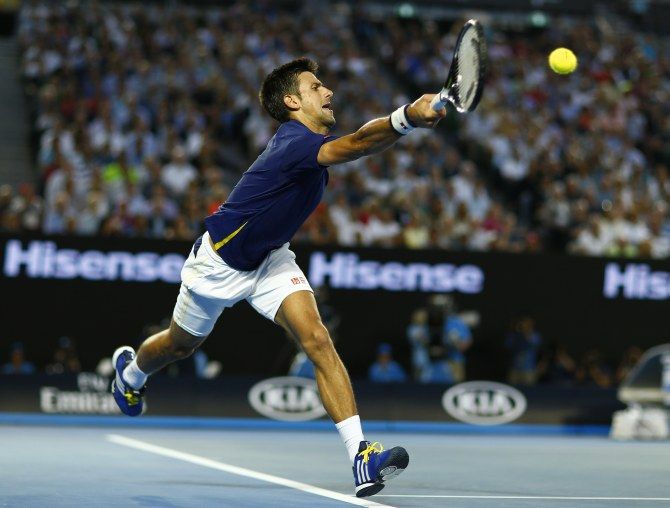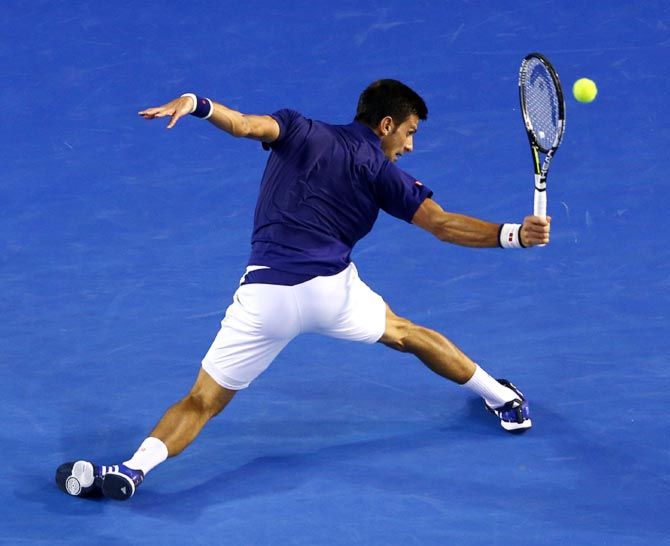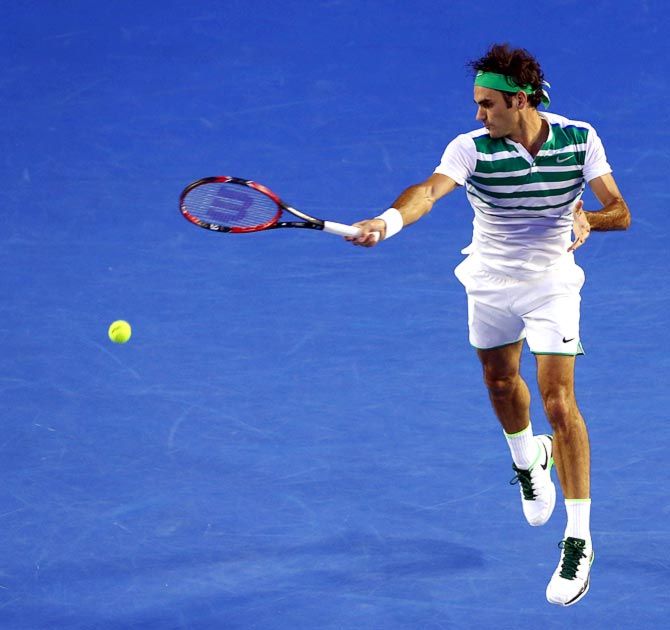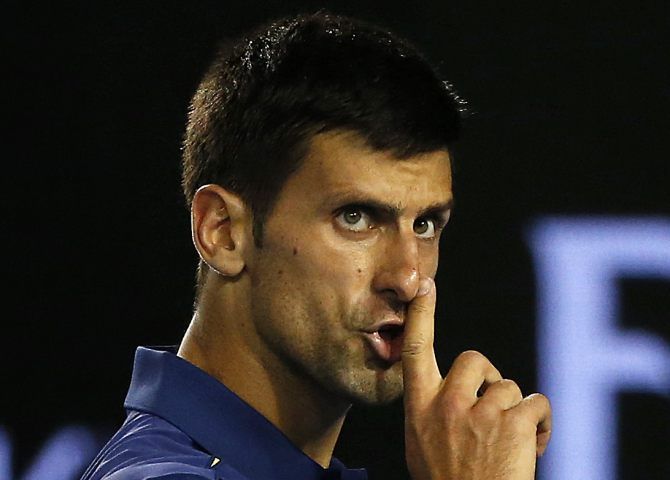 | « Back to article | Print this article |
'The future of men's tennis will be defined by Djokovic's attempt to win a Grand Slam.'
'It is a testament to how good he is and how depleted the top ranks of men's tennis is at the moment that he was winning in Melbourne despite his form being below par.'
Rahul Jacob reports from Melbourne.

On January 26, Australia's national day, the Rod Laver Arena stopped play for several minutes to honour Rod Laver himself. The 77 year old was been awarded Australia's highest national honour that day.
Laver was presented a replica of the Australian Open trophy that he had won in 1969, his first step towards an unprecedented second Grand Slam, a quadrathalon of winning all four majors in a year that has not been achieved since in men's tennis.
Then, with that Aussie gift for witty understatement, the announcer wrapped up the ceremony by saying, 'two handy players were waiting in the wings.'
It was a neat segue to the next match -- Roger Federer versus Tomas Berdych -- but the comment seemed in retrospect the defining question for tennis at the moment.
The two players waiting in the wings to assume Laver's mantle as the greatest tennis player ever are Federer and Novak Djokovic, but only Djokovic has a real chance at a Grand Slam whereas Federer must soon accept that his days of winning a major are over.
For consistency at the four majors -- the Australian, French, Wimbledon and US Open -- we have not seen anything like Djokovic and Federer in the past 50 years, since Laver won Grand Slams in 1962 and 1969.
This was underlined that day with Federer reaching his 39th Grand Slam semifinal and Djokovic reaching his 29th. Only Jimmy Connors with 31 rivals this and the Serb is likely to surpass that total by the end of this year.
The beginning of the year is a time when the future acquires a perhaps illusory clarity. In tennis terms, that crystal ball gazing must be done in Melbourne. This year or next will see Djokovic make a serious run at winning the Grand Slam. Nadal will challenge him on the odd occasion but his consistency remains questionable.
Federer will try, but he is nowhere near the player he used to be. Thursday's drubbing by Djokovic may have elicited shock among Federer fans, but it is worth remembering that Federer has played 23 Grand Slams since winning the Australian Open in 2010 but won just one -- Wimbledon in 2012. Djokovic won all their major clashes last year -- at Wimbledon, the US Open and the season-ending Masters.

The future of men's tennis will be defined by Djokovic's attempt to win a Grand Slam. It is a testament to how good he is and how depleted the top ranks of men's tennis is at the moment that he was winning in Melbourne despite his form being below par.
He won a five-setter against Giles Simon, the scrawny Frenchman nicknamed 'Chicken Legs' for his ability to run and run and his slight frame, despite an astounding 100 unforced errors.
In the quarters, Djokovic made Kei Nishikori look like a club player having an off day. The Serb's ability to retrieve and do side splits when a ball is out of reach drives even top 10 challengers to distraction.
In his desperation to get the ball past the world no 1, the Japanese overcooked forehands and looked nervous -- just as Federer does in all his big match clashes with the Serb.
The match was emblematic of the fact that in men's tennis, the up and coming are just not coming. A couple of years ago, Nishikori seemed one of that tribe along with Marin Cilic and Milos Raonic. He upset Djokovic in a memorable US Open semifinal but since then the gap between them has widened spectacularly, even though Djokovic is two years Nishikori's senior.
The most likely challengers to a clean sweep of the four majors this year by the Serb are Nadal and Stanislas Wawrinka, both of whom are older than Djokovic.
As a result, Djokovic's -- and tennis' -- next two years seem eerily similar to Federer's in 2003 and 2004. There is no real rival to him as there was none to the Swiss till Nadal started to challenge and then routinely beat Federer.
Nadal himself has become too inconsistent to seem a force any more. He lost in the first round in Melbourne, capping a run of abysmal results at the majors in the last 12 months.

Federer will be 35 in August, which qualifies as middle-aged by any definition. That he competes regularly in Grand Slam finals is a testament to the Swiss national tennis academy's ability to train its best players to play clean, hit-the-sweetspot tennis, which takes a very light toll on the body.
Tellingly, Martina Hingis at 35 is partnering both Leander Paes and Sania Mirza with great aplomb in Melbourne. Under the tutelage of Stefan Edberg last year, Federer recovered lost ground in terms of his speed and in returning to the natural serve-and-volley tennis of his youth, but he is physically and even more apparently mentally not the player who dominated tennis a decade ago.
An era of Djokovic domination and the paucity of fresh new faces is a crisis of sorts for tennis, more serious in the long run than the tarnishing of its reputation by match-fixing allegations this month.
When Federer dominated the sport, the 'tedium' of watching him destroy Lleyton Hewitt time and again or carve up an ageing Andre Agassi was lifted by the inventiveness of his tennis and how beautiful his game is.
For all Djokovic's gifts, including his astonishing tennis gymnastics, Djokovic's dismantling of opponents can on occasion seem clinical precisely because he is so far out ahead of everyone. He is a charming man, but in his desire to be liked, his interviews seem scripted.
An Australian friend remarked that Djokovic's Australia Day greetings this week involved interrupting his on-court TV interview before Jim Courier had even got his first question in.
By contrast, she said, Paes wished the crowd in a much more natural fashion after joking that Hingis was playing so well that he had asked her to partner him in the men's doubles.
ANZ, the bank, is running an ad campaign that shows the Serb telling his wife Jelena via FaceTime that he loves her. She replies, 'I know.' Did celebrity endorsements ever get this contrived, this corny?

Not surprisingly, perhaps given this overexposure, the crowd invariably cheers for Djokovic's opponents, which might be because they want a less one-sided match. But, as the Straits Times' Rohit Brijnath, the best Indian sportswriter of his generation, said to me this week while we watched Federer play Berdych, the crowd usually wants Federer to dominate his opponent (as he did against David Goffin and Berdych this past week), all the better to applaud his Mozartean finesse undisturbed.
Brijnath even found a man so enthralled by Federer that he whistled with delight as the champion came on court. With his wife listening proudly, the Australian 40-something fan said aside from his sporting prowess, he regarded Federer's post-match banter as suggestive of a comic genius. (Federer the comedian? You could have knocked me down with a tennis ball.)
As an Indian grandmother from Mumbai remarked after Federer's quarterfinal, 'We just want Federer to win quickly. No tension.'
The headlines may be of match-fixing in tennis, but the real challenge ahead is that there is no rivalry to match that of Bjorn Borg and John McEnroe, the early years of Federer versus Nadal or Pete Sampras battling it out against Agassi.
Perhaps watching an unfettered Djokovic chasing Laver's and Federer's records will be compelling enough. He was in sparkling form destroying Federer in the semis -- the first set taking about as much time as Serena Williams' 6-0 whitewash against Agnieszka Radwanska.
If one thing seemed clear in this week of very uneven tennis in Melbourne though, the much celebrated golden age of tennis may be over.